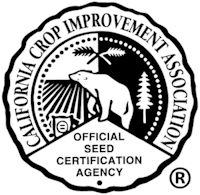Acreage Report
by Katy Soden

View more annual reports here.
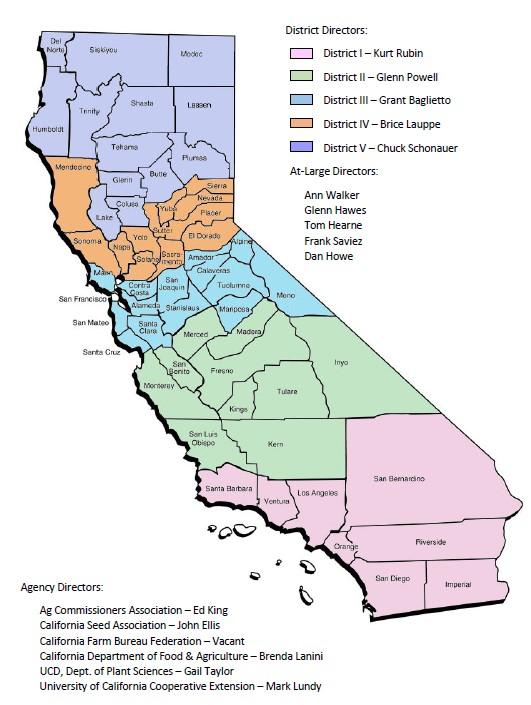
by Katy Soden
Elected Directors:
- District I - Kurt Rubin, Past President
- District II - Glenn Powell, President
- District III - Grant Baglietto
- District IV - Brice Lauppe, Secretary/Treasurer
- District V - Charles Schonauer
Appointed At-Large Directors:
- Ann Walker
- Glenn Hawes
- Tom Hearne
- Frank Saviez
- Dan Howe
Agency Representatives:
- Agricultural Commissioners Association - Ed King
- California Seed Association - John Ellis, Vice President
- California Department of Food & Agriculture - Brenda Lanini
- UC Cooperative Extension - Mark Lundy
- California Farm Bureau Federation - Vacant
- UCD Department of Plant Sciences - Gail Taylor
University Advisory Committee:
- UCD College of Ag & Environmental Sciences - Anita Oberbauer
- UCD Seed Biotechnology Center - Allen Van Deynze
- UCD Foundation Seed Program – Timothy Blank
Crop Update - Alfalfa, Rice, and Sunflower
by Timothy Blank
After an overall decline in Certified seed acreage in California since 2018, we are expecting an ascent in acres in 2023. 2022 saw the lowest acres in CCIA’s program since 1974. Here are a few updates for alfalfa, rice, and sunflower:

|
Alfalfa: Most 2023 alfalfa applications have been submitted and there is a 2K increase in acres applied. The company dynamics of the proprietary, non-dormant alfalfa varieties continues to shift. The role of California-produced public, non-dormant varieties continues to be important for the world. |
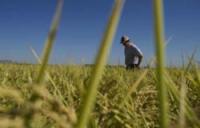
|
Rice: With the improved water situation, rice seed acres should increase 8-10K acres to normal levels. Even though rice seed acreage was significantly down in 2022, there only appears to be seed shortages among a few specialty rice varieties (i.e. Calmochi-203, Koshihikari, Calaroma-201). |

|
Sunflower: The Certified acreage forecast for sunflowers is less clear; 2023 may look similar to 2022 in total acres. A large void was created by the closing of Pioneer’s commercial division in Woodland, but other sunflower producers in CA are planning increases in production levels. |
by Katy Soden

The CCIA has conducted a review of the turfgrass certification program and determined revisions to the program fees are in order. The CCIA Board of Directors has approved the restructuring of the program fees. Effective June 1, 2023, application fees will be $45/acre with a minimum application fee of $100. There will no longer be a $20 fee for turfgrass certificates. The goal of the fee restructuring is to align with industry standards and ensure producer compliance.
by Alex Mkandawire
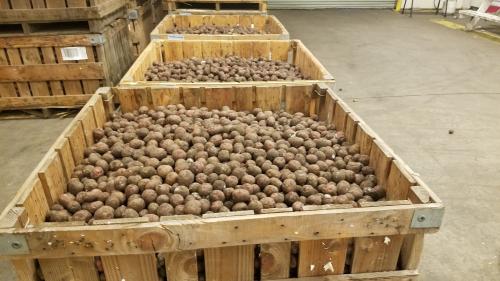
The US Department of Agriculture (USDA) is responsible for seed potato certification in the US and that responsibility is delegated to individual states. In California, the Department of Food and Agriculture (CDFA) ratified USDA’s ‘State National Seed Potato Harmonization Program’ and the ‘United States Potato Industry Management Plan for Potato Viruses that Cause Tuber Necrosis’ (Virus Management Plan) to ensure that all participating states and Canada produce and share seed potato planting stock that is healthy particularly with regard to viral diseases. The CCIA conducts seed potato certification in California under a Memorandum of Understanding with CDFA. Last year CDFA requested CCIA to amend its Potato Standard to ensure the CCIA potato program’s compliance with these two documents especially with respect to Post-Harvest Tests [PHTs].
The amendment of the Potato Standard with regard to PHTs is on both the front and back ends of the certification process. On the front end, under Item V [Seed Stock Eligibility Requirements], the CCIA will require all seed lots that enter the state as planting stock in the certification program to have a certification tag or a bulk certificate for verification of their identity and generation but must also have a North American Seed Potato Health Certificate (NASPHC) that shows that the seed lot was tested and it passed a PHT. The seed lot should also have a shipping point inspection report indicating that the seed lot had less than 0.5% tuber necrosis. The deadline for submission of an application to produce seed has been extended from 3 to 6 weeks after planting to provide more time for the applicant to collect and attach these documents to the application. And on the back end, under Item IX [Post-Harvest Testing Requirements], PHT requirements for all seed lots certified by the CCIA will depend on their final destination. CCIA will require applicants to indicate the final destination of their seed lot on the tag request form. Seed lots that will be recertified within California, i.e. those intended to produce another allowable certified generation, will not require a PHT and their tags will indicate that they are ‘for in-state use only’. Seed lots that will be shipped to states that do not produce seed potatoes, like Florida, will not require a PHT since such states are not signatories on the above USDA documents. Seed lots that will be exported, to countries other than Canada, will not require a PHT since those countries are also not signatories and the tags will show ‘for export’. Seed lots that will be recertified or will produce commercial potato crops in states that produce certified seed potatoes or in Canada will require a PHT and the tags will show ‘PHT required’. Applicants will be responsible to ensure that a PHT is conducted by an appropriate certification agency and report the test results to CCIA for issuance of an NASPHC for that lot. The CCIA has discussed the amended standard with CDFA and the California potato industry and it was approved by the CCIA Board of Directors at their meeting of 23 February, 2023.
[Contact: Alex Mkandawire abmkandawire@ucdavis.edu].
Seasonal Field Inspectors Needed
by Katy Soden

CCIA is once again looking for seasonal field inspectors to assist with field inspections for sunflowers and rice. Description of the position:
California is the source of the highest quality hybrid sunflower seed worldwide and the vast majority of this seed is exported to Europe for planting as an oil crop. The European Union requires that all sunflower seed planted be ‘certified seed.’ Certified seed is pedigreed seed that has been inspected by a 3rd party agency to assure that it meets minimum quality standards. In California, the California Crop Improvement Association is the seed certification authority. The individual being hired will be trained by CCIA staff. Sunflower seed fields are inspected once prior to bloom, and twice during bloom. During these inspections, the inspector will report: growth stage, isolation observations, frequency of off-type sunflowers, presence of other crops, presence of weeds, and presence of diseases. This person may also be requested to inspect other seed crops if there is a need.
Here is what we are looking for in potential applicants:
- Available to work 40 hours a week (overtime may be required during bloom period) between May 15th and August 31st. The busiest time will be June and July, with work tapering off in August. The time could be extended through September if there is a need and willingness to inspect other crops.
- Has a CA driver’s license, automobile insurance, and access to a vehicle
- Willingness to work independently after receiving training
- Ability to work in field conditions. Field conditions include walking on uneven terrain, working in hot temperatures, driving on farm roads, and being in the presence of honeybees.
- Basic working knowledge of computers
- Willingness to ask questions when uncertain
If you are interested please contact Katy Soden at krsoden@ucdavis.edu.
Seed Sampler Training Workshops
by Alex Mkandawire
The annual dates for Seed Sampler Training will be scheduled as follows:
• Davis: third week in November
• Fresno: third week in January
• Holtville: third week in February
More information can be found about the CCIA Seed Sampler Training program at CCIA Seed Sampler Program.
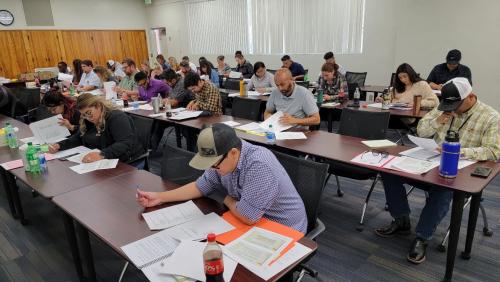
California Crop Improvement Association (CCIA) is recognized by the California Seed Law as the official seed certifying agency for agronomic and vegetable seed in the State of California. The CCIA’s objective is to ensure that California certified seed is of high quality. Quality characteristics of seed that are required for customer satisfaction include trueness to variety, varietal purity, freedom from noxious and problematic weeds, low inert matter, high germination and devoid of problematic seed-borne diseases. A seed laboratory can determine these quality attributes of a seed lot from a seed sample test. Both the state and federal seed laws are truth-in-labeling laws in that they require that a labeler, seller or grower must take a representative sample of a seed lot that is destined for the market and send that sample to a seed laboratory for testing and that only the information from a Laboratory Report of Analysis for that test should be used on a seed label for that seed lot. A representative seed sample is that which provides proper connection between the seed lot at the warehouse and the sample that is tested by a seed laboratory to provide accurate and reliable seed labeling information. As a result, proper seed sampling is the first step in conducting a good and relevant seed test.

The Association of American Seed Control Officials [AASCO] recognized the importance of seed sampling in 2012 but noted the lack of certified seed samplers. The Association created a Seed Sampler Trainer Accreditation Program in 2013 and CCIA had the first Accredited Seed Sampler Trainer that year to train certified seed samplers in California. A seed sampler training program was set up at CCIA whose objective is to ensure that certified seed samplers use methods and equipment that are approved by AOSA (Association of Official Seed Analysts) to obtain representative samples. These guidelines are contained in the AASCO Handbook of Seed Sampling. The Handbook presents methods, guidelines and equipment for both regulatory and industry applications to uniformly obtain representative seed samples for laboratory testing. Seed sampler training should lead to uniformity in sampling of all certified seed that is produced and used in or derived from California. More importantly, it should also lead to accurate seed test results and labels that better reflect the quality of seed in warehouses being offered for sale and/or shipment. Therefore, CCIA requires that all seed samples sent to the seed laboratories for certification purposes be sampled by certified samplers. This program certifies samplers for a period of three (3) years and the samplers are recertified every three years thereafter. This year marks 10 years since the inception of the seed sampler training program and to-date the program has certified and recertified over 700 seed samplers from the county agricultural commissioners and private warehouses in the state.
During this 2022/23 crop season the program certified and recertified 19 samplers from the Sacramento Valley, 9 from the Central Valley, and 13 from the Imperial Valley after their attendance of the training on 15 November, 2022 at Parsons Certification Center in Davis, on 17 January, 2023 at Westside Research and Extension Center and Barkley Seeds at Five Points and on 21 February, 2023 at the Desert Research and Extension Center, respectively. [Contact: Alex Mkandawire abmkandawire@ucdavis.edu].
by Nicole Hostert
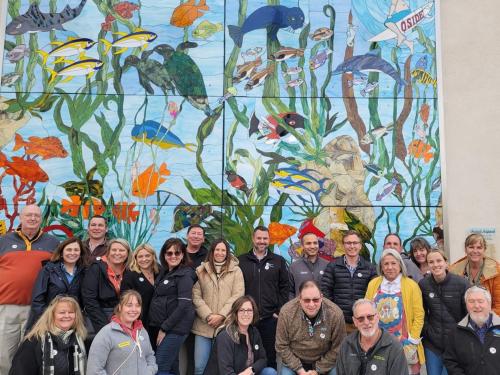
The Pacific Seed Association held its 97th annual meeting at the Seabird Resort and Spa in Oceanside, California February 11-15th. The presentations addressed issues facing the industry such as Succession Planning, the 10,000 Foot Level Overview and Education for Career Management Solutions, Transportation as well as Internal and External Communications. We were fortunate to have a line-up of top-notch speakers including Joseph Strazzeri, Esq., from the Law Firm of Strazzeri Mancini LLP, Shawn Brook, President of Seed World, Andrew Hwang, Port of Oakland, Dan Johnson, Laufer Group International and Paul Minehart, North America Syngenta Crop Protection LLC. These were followed by the PSA Annual Meeting of the Association which provided an overlook of this year’s activities and a sound financial report of the state of the Association. The members also managed to have some fun playing golf and participating in a walking food tour (pictured).
The PSA offers the ability to network with a diverse group of members from the western United States, as well as Canada and Mexico. Along with educating and communicating to members about the legislative and regulatory issues affecting the seed industry, they also provide educational, networking and recreational opportunities. If you would like to learn more about the Pacific Seed Association, check out their website www.pacificseed.org or join their quarterly lunch &learn on March 29th at noon to hear from Brianna Jakosa who will be discussing recruiting, retaining and inspiring today’s multi-generational workforce.
by Timothy Blank
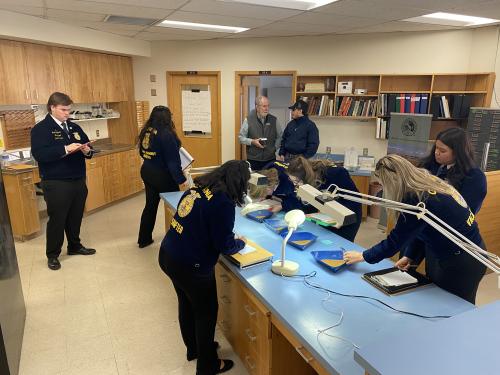
The CCIA continues to be involved with the FFA Agronomy Contest. On Saturday, March 4th, hundreds of FFA students from across California gathered for the 47th Annual UC Davis Field day. Among those students, 38 from 9 schools took part in the Agronomy Contest held at the Parsons Building and the Plant and Environmental Sciences Building. Since 2010, Timothy Blank has served as advisor for the Agronomy Contest. The students judged the quality of 4 samples of clover seed and alfalfa hay, and provided verbal reasons for their placements. Bob Stewart and Dan Putnam heard the student reasons for the clover seed and alfalfa hay, respectively. The students also identified 5 insects, 5 diseases/disorders, and 50 live plant and seed samples of different weeds and crops. Students will go on to participate in this same contest at other locations and improve their skills before the State competition in May. The top scoring schools for the UCD Agronomy Contest this year were (1) Anderson, (2) Woodland, and (3) Cottonwood-West Valley.
by Katy Soden
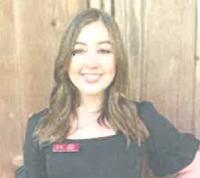
Isabella Ruport is a 3rd year student of Agricultural Business at California State University Chico. She is involved on campus and in the community through the Sigma Alpha sorority. This has been a great experience to meet other women with similar interests in the agriculture industry. Isabella worked for CASS, Cooperative Agricultural Support Services, as an almond inspector this semester and hopes to return next season. She is especially grateful for the scholarship since she is responsible for much of her college expenses.
